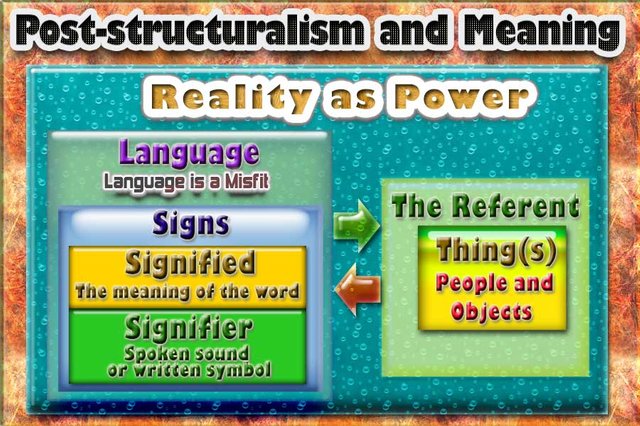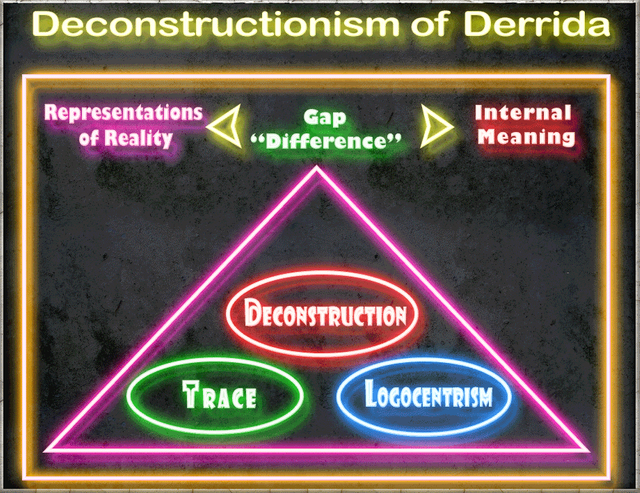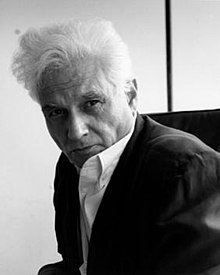The Dialectics of Liberation: Anarchism, Existentialism, and Decentralism.
Part 2 - The Short History of Existentialism:
VI- Post Structuralists - Jacques Derrida
"We are the wizards of our own will and destiny." - charlie777pt
Introduction
Descartes and Fredrick Nietzsche, maybe are the first deconstructors of the subjective truth of language.
One of the most interesting assumptions about post-structuralism is the problem of multiple meanings, that was approached by Roland Barthes.
When we write a book, it represents a number of books equal to the numbers of readers, that create multiple meanings, separating the concept of signified to a myriad of "signifieds" for each person's signifier."The text is a practice that could be compared to political revolution: the one brings about in the subject what the other introduces into society." - Julia Kristeva in Revolution in Poetic Language
In our modern life in the Western culture with its arrogant cultural narcissism, we are more grounded by logical and rational thinking, and we tend to forget our Instinct and the Imaginary, the power of intuition and imagination as a way to deconstruct reality, to transcend and rebuild it.
"Those who have the privilege to know, have the duty to act" - Dr. Tyrone Hayes in Tedx Talk
Einstein said that education is not about facts, but to learn how to think for ourselves.
Philosophy is the seek for wisdom, where we are tutors and pupils of Reality, like a Gestalt that can't be separated or perceived in words, speech or writing.
“But instinct is something which transcends knowledge. We have, undoubtedly, certain finer fibers that enable us to perceive truths when logical deduction, or any other willful effort of the brain, is futile.” - Nikolas Tesla about the act of creativity.
Science and technology are just the results of philosophical reflection in a process of the deconstruction of reality, drilling to find the layers of the principles, and the genesis of the structure we are analyzing.
|
Jacques Derrida was a Jewish-French philosopher from Argelia, that dreamed of being a football player but he finished by being one of the biggest influences in post-structuralism and postmodernism and the father of deconstructionism, using semiotic analysis under the umbrella of phenomenology, but the most of the times he referred himself as a historian.
Derrida was a prolific writer and also influenced psychoanalysis, politics, religion, feminism and LGBT studies, as well as the academic thought in ontology, epistemology, ethics, hermeneutics, linguistics, and in the arts and its criticism.
It looks like a pattern of the influences of Jacques Lacan, but the most important part was the breath of fresh air in the activism and the political movements, that made him a controversial figure.
"There is nothing outside the context" - Jacques Derrida
He was accused by academics of denying scientific standards of intelligibility and accuracy, to attack the values of scholarship, reasoning, and truth, criticizing the "sacred" institutions, and all the Western belief system, in the matters of nature, culture, speech, and writing because there is no truth in language.
Derrida is more important today than ever because he wanted to shake the foundations of Western philosophy and culture, and he used deconstruction to question these assumptions, that he called "logocentrism" that is infiltrated in the philosophical thought like hierarchized binary that oppositions in any discourse or writings.
He created a discontinuity in the rationalist thought of the traditional Western intellectual life, emphasized with Barthes' theory of literary text of multiple meanings, "killing" the assumption of the connection with the author's intended meaning.
"Literature is the question minus the answer."- Roland Barthes
Derrida uses linguistic concepts of the meaning of the signs, composed with a signified (idea) and a signifier(word, sound, and image) that are related to other complementary signs and the present traces, hidden in the difference between speech and writing.

"The universality of thought is supreme and sovereign. Nothing surpasses understanding and understanding. What we lack is the desire to know, to read or to interpret, the desire to give meaning to all the thought that expresses itself"- Henry Miller in Para ler na Retrete (To read on the WC)
His text analysis uses the notion of binary oppositions a structuralist concept that sees human thoughts as working in opposites with other terms inside language.
Derrida developed a form of semiotic analysis revealing the logocentrism of our beliefs, like a self-centered-truth that serve as master self-deception of our thoughts and behaviors, and to justify our existence.
Logocentrism
The Logocentrism is the Logos of the metaphysics (God, Reasoning, Truth) interacting with the speech in language, and its imitation in writing and sign language.Logocentrism is the "metaphysics of presence" a desire to find a signified that transcendents the whole signifiers to create meaning transcending all the signs.
Deconstruction
Deconstruction finds the metaphysical assumptions that are not questioned and as he pointed out, we can't comprehend the structure if we don't understand its genesis.Deconstruction does not mean destruction but a kind of reverse engineering to drill down, analyze, and find the forces of signification within the text, to de-constructor its unity or even the author differences of undecidability and the several meanings. These binary oppositions, the critical differences of ambiguities.
Trace
The difference brings up the idea of a trace of the sign differs/defers.The present signifiers of Western civilization and its culture always contain traces of other absent signifiers, so the signifier can't be totally present or absent.
For him, "difference"- differance in French - (meaning to differ and to defer) is the womb of meaning, generated in the conflict of presence and absence, the hole between speech and writing, the gap of internal meaning and the representations of Reality.
Every present must be related by a trace of an absent meaning that defines it.

Hermeneutics in the line of Heidegger and Ricoeur connected things like in communication, in writings or objects, with its interpretation relating to the social situations, while the analytical conception of Wittgenstein and Carnap found the meaningless of relying upon conventions, prejudices and rules in the games of language to create meaning.
The postmodern and post-structural philosophical approach of Derrida and Lotyard, aim to deconstruct the big conceptual "stories" of Western thought, of a subject that is situated in history, the values of humanity, social evolution, the search for truth because these narratives inhabit like invisible ghosts in our mind, can't be considered a structuralist totality, bringing the multi-meaning of the difference between languages, cultures, and ways of thinking.
So for post-structuralism, there are no universal Truths, but a plurality of meanings variating within contexts and generating a myriad of different significations, and also denies the fixed statism of the relationship of the signifier versus signified.
To finish I'm going to give a simple example of the Freud's psychoanalytic concepts to establish the universal rule that the interpretation of dreams should rely on the sexual content, but Jung found out that ancient remote populations living without the influence of modern society, always dream a lot about food abundance, like corn fields, fruits, meat banquets instead of the libidinal content of our industrialized societies, revealing different desires from our "civilization".
"Today's "civilized" world is a whole field of weapons where the victims shout silently, "peace, peace, we want peace"." - Henry Miller in reflections on the death of Mishima
PHILOSOPHY: Jacques Derrida
I really love the existentialism and deconstruction in Laurie Anderson's performances and music.
Laurie Anderson - Sharkey's Day
Laurie Anderson - O Superman [Official Music Video]
If you really loved it here is the full show-
Laurie Anderson Home Of The Brave 1986
Photo source: Wikipedia
The Dialectics of Liberation: Anarchism, Existentialism, and Decentralism.
Published Posts:
Introduction to the Dialectics of Liberation: Anarchism, Existentialism and Decentralism
I - Anarchism
- What is Anarchism?
- The History of Anarchism
- Part 1 - Pre-Anarchy - Social Revolution
- Anarchy: Revolution Against The State
- Anarchy Today
- Index and Conclusions of part 1 - Anarchy
II - Existentialism
- What is Existentialism ?
- Part 1 - Unplugged Introduction to Existentialism
- Part 2 - The Short History of Existentialism: I - Early Pre-existentialism
- Part 2 - The Short History of Existentialism: II - Pre-Existentialists
- Part 2 - The Short History of Existentialism: III - Phenomenology - Brentano to Husserl
- Part 2 - The Short History of Existentialism: III - Phenomenology - Jaspers to Sheller
- Part 2 - The Short History of Existentialism: IV - Humanistic Existentialists - Buber, Arendt, and Tillich
- Part 2 - The Short History of Existentialism: V - Humanistic Existentialists - Rollo May
- Part 2 - The Short History of Existentialism: V - Humanistic Existentialists - Abraham Maslow
- Part 2 - The Short History of Existentialism: VI - Post -Structuralism - Jacques Lacan
- Part 2 - The Short History of Existentialism: VI - Post -Structuralism - Michel Foucault
- Part 2 - The Short History of Existentialism: VI - Post -Structuralism - Emmanuel Levinas
- Part 2 - The Short History of Existentialism: VI - Post -Structuralism - Jacques Derrida - This post
Next posts on the Series:
II - Existentialism(Cont.)
- What is Existentialism ? (Cont.)
- Part 2 - The Short History of Existentialism: VI - Post -Structuralism - Paul Ricouer
- Part 3 - The Philosophy of Existentialism: I - The Meaning of Nonsense
- Part 4 - The Fear of Freedom of Erich Fromm
- The "Existentialists"
- Part 1 - The Players and the Times
- Part 2 - Jean Paul Sartre - the Man of The 20th Century
- Humanism and Existentialism
- Existentialism and Anarchism
- The Future : Posthumanism, transhumanism and inhumanism
III - Decentralism
- What is Decentralism?
- The Philosophy of Decentralism
- Blockchain and Decentralization
- Anarchism, Existentialism, and Decentralism
IV - Dialectic for Self-Liberation
- The Dialectics of Liberation Congress
- Psychedelics, Libertarian and artistical movements
- The Zen Buddism of Alan Watts
- Psychoanalysis and Existentialism
- The Anti-psychiatry movement
 2 - Jacques Derrida (1930-2004)
2 - Jacques Derrida (1930-2004)
This post was upvoted by SteeveBot!
SteeveBot regularly upvotes stories that are appreciated by the community around Steeve, an AI-powered Steem interface.
Downvoting a post can decrease pending rewards and make it less visible. Common reasons:
Submit
Este post recebeu 5.00% de upvote da conta @steemitportugal!

Obrigado por fazeres parte da comunidade @steemitportugal .
Downvoting a post can decrease pending rewards and make it less visible. Common reasons:
Submit
Congratulations @charlie777pt! You have completed the following achievement on the Steem blockchain and have been rewarded with new badge(s) :
Click here to view your Board
If you no longer want to receive notifications, reply to this comment with the word
STOPDo not miss the last post from @steemitboard:
Downvoting a post can decrease pending rewards and make it less visible. Common reasons:
Submit